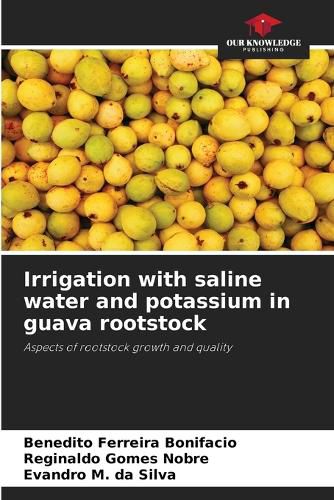Readings Newsletter
Become a Readings Member to make your shopping experience even easier.
Sign in or sign up for free!
You’re not far away from qualifying for FREE standard shipping within Australia
You’ve qualified for FREE standard shipping within Australia
The cart is loading…






This title is printed to order. This book may have been self-published. If so, we cannot guarantee the quality of the content. In the main most books will have gone through the editing process however some may not. We therefore suggest that you be aware of this before ordering this book. If in doubt check either the author or publisher’s details as we are unable to accept any returns unless they are faulty. Please contact us if you have any questions.
The guava tree is of socio-economic and food importance to the northeastern region of Brazil, where there is limited availability of good quality water. With this in mind, the research was carried out with the aim of evaluating the effects of different levels of irrigation water salinity associated with potassium fertilization on the production of guava rootstock seedlings. The experiment was carried out in a greenhouse at the Center for Agrifood Sciences and Technology at the Federal University of Campina Grande, Pombal - PB. The experimental design was in randomized blocks, in a 5 x 4 factorial scheme, with the treatments referring to five levels of electrical conductivity of the irrigation water (ECa = 0.3; 1.1; 1.9; 2.7 and 3.5 dS m- (1)) in interaction with four doses of potassium (70, 100, 130 and 160% K) with the recommended dose of 100% K (726 mg of K dm-3 of substrate) for guava seedlings and four replications, each plot consisting of two useful plants, whose genotype was the Paluma cultivar.
$9.00 standard shipping within Australia
FREE standard shipping within Australia for orders over $100.00
Express & International shipping calculated at checkout
This title is printed to order. This book may have been self-published. If so, we cannot guarantee the quality of the content. In the main most books will have gone through the editing process however some may not. We therefore suggest that you be aware of this before ordering this book. If in doubt check either the author or publisher’s details as we are unable to accept any returns unless they are faulty. Please contact us if you have any questions.
The guava tree is of socio-economic and food importance to the northeastern region of Brazil, where there is limited availability of good quality water. With this in mind, the research was carried out with the aim of evaluating the effects of different levels of irrigation water salinity associated with potassium fertilization on the production of guava rootstock seedlings. The experiment was carried out in a greenhouse at the Center for Agrifood Sciences and Technology at the Federal University of Campina Grande, Pombal - PB. The experimental design was in randomized blocks, in a 5 x 4 factorial scheme, with the treatments referring to five levels of electrical conductivity of the irrigation water (ECa = 0.3; 1.1; 1.9; 2.7 and 3.5 dS m- (1)) in interaction with four doses of potassium (70, 100, 130 and 160% K) with the recommended dose of 100% K (726 mg of K dm-3 of substrate) for guava seedlings and four replications, each plot consisting of two useful plants, whose genotype was the Paluma cultivar.